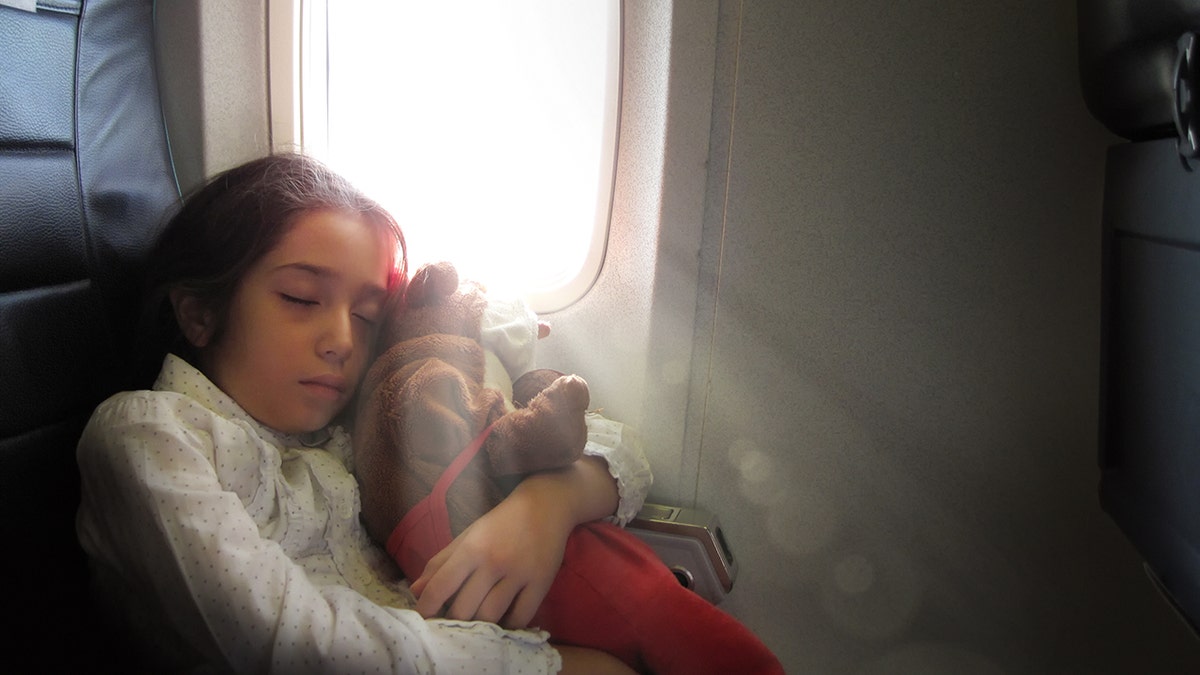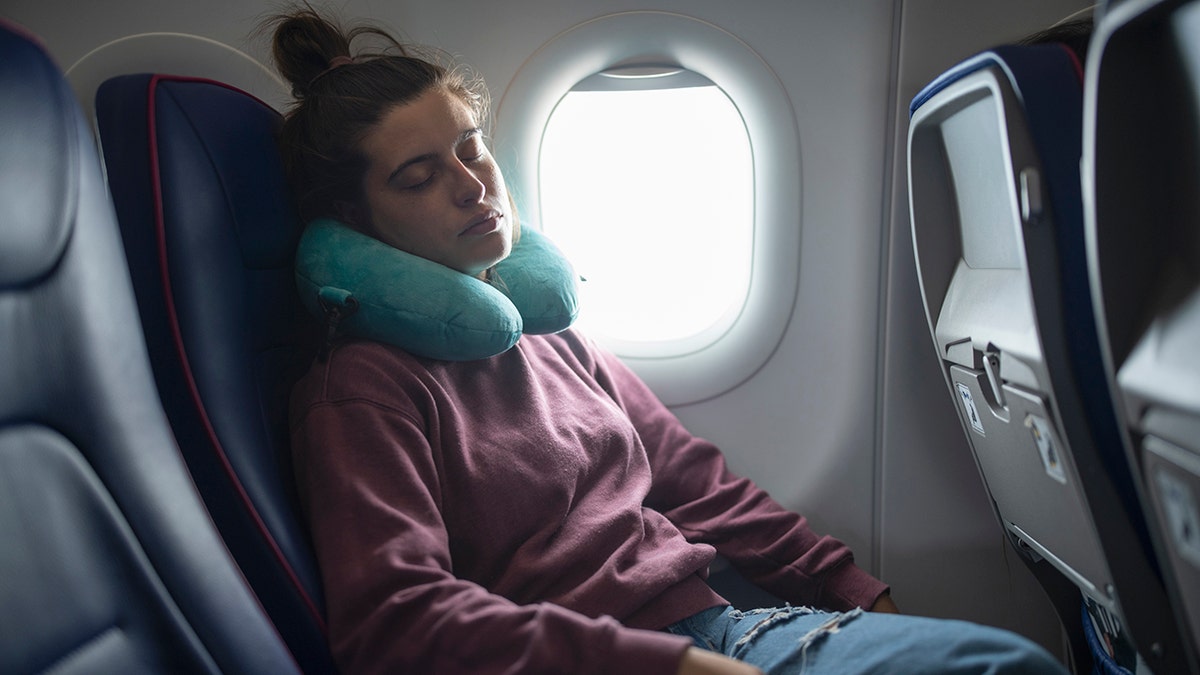7 tips for falling asleep on long-haul flights (Hint: Skip the alcohol, coffee and sedatives)
For anyone who has taken a long flight — say, of six hours or longer — the goal is usually to sleep for at least part of the stretch, especially if it’s an overnight flight.
But falling asleep on a plane is not always easy, whether it’s a long flight or considerably shorter.
Fox News Digital spoke to sleep experts to ferret out their tricks and strategies about how to get some decent shut-eye on flights — so that you pass the time and arrive at your destination as refreshed as possible.
LACK OF SLEEP IS COMPROMISING THE MENTAL HEALTH OF 78% OF ADULTS, SURVEY FINDS
While sleep during travel can be challenging as the conditions and environment are very different than at home, take these thoughtful tips to heart.
1. Pick a seat that’s conducive to rest
Although the aisle seat gives you more freedom to stretch your legs and get up without a fuss, choosing a window seat in coach with a seat back that reclines and is far from the lavatory and galley is a better choice.
That’s according to Whitney Roban, PhD, a New York-based clinical psychologist, sleep expert and founder of Solve Our Sleep.
Or, splurge for business class, if you can, for an all-around better sleep experience, she suggested.
2. Wear the right clothes for travel
“Before you board, wash your face and change into loose-fitting clothing with comfortable socks,” suggested Roban — almost as if you’re getting ready for bed.
SLEEP EASY: 6 WAYS TO ADJUST YOUR BEDROOM SO YOU GET A GOOD NIGHT’S REST
It’s also a good idea to pack some extra layers in case the temperature on the plane changes.
3. Try to recreate other sleep strategies that work for you
“To help make your travel experience as smooth as possible, try to keep as much of your home sleep habits as you can,” said Peter Polos, M.D., PhD, a sleep medicine specialist and sleep expert for Sleep Number. He’s also an associate professor of sleep medicine at Hackensack JFK University Medical Center in New Jersey.

“These [habits] include limiting cell phone or computer use within an hour of going to sleep,” Polos said.
4. Avoid certain foods and drinks
It’s best to avoid fatty foods and alcohol before or while on a long-haul flight.
Said Polos, “There are some general recommendations with respect to food and sleep, whether or not one is traveling. We recommend that foods high in fat, spice or acid content (such as tomatoes and some fruits) be avoided at or near bedtime.”
WWII-ERA MILITARY SLEEP METHOD COULD HELP INSOMNIACS NOD OFF QUICKLY, SOME CLAIM: ‘PEACE AND CALM’
He added, “There are many reasons for this, but one of the main ones is that fatty foods can put you at more risk for acid reflux, fluctuations in breathing patterns, delayed absorption and abdominal discomfort.”
Polos said as well, “Of course, caffeine should be avoided due to its stimulatory effect; however, caffeine can also be associated with dehydration. [And] alcohol is always contraindicated at bedtime.”

He shared more insight on that point: “Alcohol might help you fall asleep, but it can have a negative impact on your sleep cycle and cause you to wake up more and contribute to dehydration,” he continued. “It really should be avoided during travel.”
He also noted that stimulants like caffeine and alcohol can work in conjunction with the dry airplane cabin, resulting in significant dehydration. “This, too, can disrupt sleep.”
Although it’s reasonable to travel with snacks, Dr. Polos suggested selecting healthy, filling meals or snacks.
5. Bring your own travel sleep accessories
Airplanes aren’t always the most comfortable when you’re sitting upright, so Dr. Polos said it can become even more uncomfortable when you’re sitting in the same position for an extended period of time.
HEALTH TIPS FOR 2023: SLEEP ESSENTIAL FOR RESTORING YOUR BODY AND MIND
“I recommend bringing a pillow from home, like an adjustable pillow that can support your head and neck, a smaller travel pillow that is easy to pack or even a sleep mask, which can help to block light,” he said.
He also suggested listening to music or bringing some reading material.

“These may help reinforce [the] drive to sleep,” he suggested.
In addition, try to keep air vents open to make the air around you as cool as possible, said Polos.
6. Be careful about taking sedatives
Although you may be tempted to take something to induce sleep, it may not be the best idea. That’s according to Henry Ting, M.D., Delta’s chief health officer, based in Atlanta, Georgia.
“Be careful of taking any sedatives,” Dr. Ting said.
“Make your goal to be comfortable and relaxed, without any stress.”
“While taking sedative medication may be tempting, especially on a long-haul international flight, these medications affect neurotransmitters and can actually cause you to be more stimulated than relaxed,” he said.
CLICK HERE TO SIGN UP FOR OUR HEALTH NEWSLETTER
“Instead of sedatives,” he said, “opt for a good neck pillow and comfy clothes.”
7. Don’t get too stressed about falling asleep or not
It’s best not to stress if you can’t fall into a deep sleep on board the flight, Roban advised.
“Trying to force sleep will only make it more difficult to sleep,” she said.
“Make your goal to be comfortable and relaxed, without any stress,” she added.
“If you can succeed in staying relaxed in mind and body, sleep will come.”
For more Health articles, visit www.foxnews.com/health.
Read the full article Here


